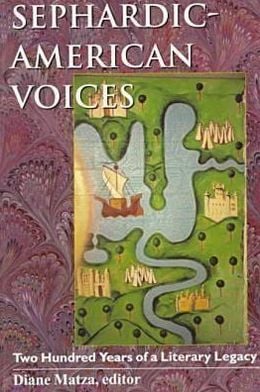

 |

|

The average rating for Sephardic-American Voices: Two Hundred Years of a Literary Legacy based on 2 reviews is 4.5 stars.
Review # 1 was written on 2018-05-08 00:00:00 Alexandre Benson Alexandre BensonWhen most people think about American Jewish authors, they think about those with European backgrounds, the Ashkenazim. While the numbers are far smaller, there is another group of American- Jewish writers who have a Sephardic history. They, or their ancestors, came from Mediterranean or Arab countries. Emma Lazarus is one of the few that people do know but many are aware only of her poem on the base of the Statue of History. Diane Matza gathered works from her and almost three dozen other Sephardic-American writers and published them in SEPHARDIC-AMERICAN VOICES. The book opens with a short history of the Sephardim, primarily their lives in Iberia until they were expelled around 1492 but continuing through more recent times. The introduction explains how specific chapters relate to specific situations. SEPHARDIC-AMERICAN VOICES is an assortment of memoirs, poems, plays, short stories, and excerpts from novels covering early times, life in their home countries, immigration, the Holocause, assimilation, biblical influences, and identity. Among the chapters is an excerpt from Ruth Knafo Setton's memoir. Originally from Morocco, she moved to Pennsylvania where she encountered ignorance and racism from the Jews in her new synagogue. She tells her grandmother's story: In 1912 with the French about to take over Morocco, they ordered everyone-- Jews and Arabs-to give up the weapons. The Jews handed them; in the Arabs held on to theirs and stormed the Jewish quarter for three days looting and burning houses and killing every Jew they found. Those who survived ran to the Sultan's palace right outside the Jewish quarter. The Sultan was basically a good man. When he saw what was happening he opened the gates to the cages of his menagerie in the courtyard where he kept exotic, wild animals. The Jews were safer in his zoo with pumas tigers and leopards, that in the streets. In an excerpt from his novel ISLAND OF STRANGERS, Jordan Elgrably write about a Sephardic reporter born in America but now living in Paris and covering wars in the Middle East. He states the Jews in Paris are "heavily anti-American for political reasons.....The US government and the interests that controlled it being largely viewed as corporate hegemony which continue to pursue the dream embodied in the Monroe Doctrine - a policy that allowed domination of the Americas by any available means including embargo, military occupation, torture, mutilation, and even assassination...The America sphere of influence had been expanded to cover the entire globe, and the US is commonly referred to among left-wingers as the dictatorship of financially elites." Most Americans when first exposed to the idea were idea were offended. "They sincerely believed America was fighting the good fight, that free enterprise was winning out over Soviet economies - that capitalism, surely, was imperfect but still the best man can do.… Kanafani (the main character) had even heard the US referred to as a kakistocracy - a government ruled of the worst men in the nation." Elgrably wrote his book in the 1990s. The first time I heard the word "kakistocracy" was in 2017. He was definitely ahead of his time. SEPHARDIC-AMERICAN VOICES brings deserved attention to a group of writers who have been ignored for too long. My only complaint is that while Matza does provide biographical information about each author, she doesn't give the dates that the pieces were originally published. |
Review # 2 was written on 2013-03-16 00:00:00 Robert Roselli Robert RoselliThis book gave me exactly what i was looking for; a taste of the overlooked, under-served segment of our multicultural smorgasbord in the USA. Sephardic Jews are considered descendants of Spain, the Sephardi world, ruined by the expulsion in 1492 by Ferdinand & Isabella, the Spanish King & Queen who seized the properties & monies of these minorities in the formerly Moorish Muslim Spain, to pay for their costly wars. After their Golden Age of living in harmony with the Moors, the Jews fled to many countries. Here you will find over 200 years worth of a 'literary legacy' you never knew existed in North America. These immigrant voices are from very different places, and illuminate the non-European, non-Ashkenazi Jewish experience in countries like Syria, Salonica, Turkey, Iraq and Lebanon. The sections deal with these themes: 1. Tradition & Assimilation: The Descendants of the Colonial Shephardim 2. Memoirs of the Homeland: Levantine Sephardim Remember, Return & Record 3. Stories of the Levantine Immigrants 4. The Holocaust 5. Historical & Biblical Influences 6. Issues of Identity There are good lessons here, original and innovative approaches, and another lens through which to view the globalization of us all. |
CAN'T FIND WHAT YOU'RE LOOKING FOR? CLICK HERE!!!